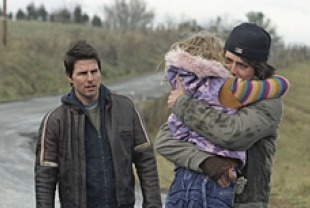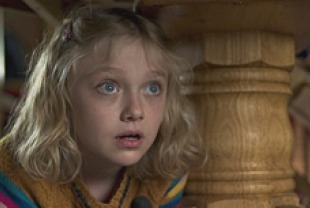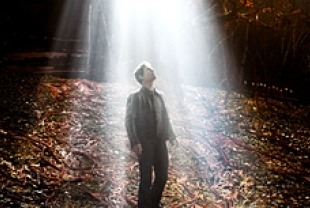Ray Ferrier (Tom Cruise) is a divorced dockworker who lives alone in a ramshackle house in New Jersey. His ex-wife Mary Ann (Miranda Otto), who has remarried and is pregnant, has main custody of their two children: teenage Robbie (Justin Chatwin) and ten-year-old Rachel (Dakota Fleming). When she drops them off to spend a weekend, Ray is late arriving home and discombobulated as usual. Mary Ann has to carry Rachel's suitcase up to her bedroom since he has no eye for the essential care-taking responsibilities of parenthood. After she and her husband leave to go visit her parents in Boston, Ray suggests that he and Robbie play catch in the yard. The teenager defiantly wears a red and white Red Sox cap in contrast to Ray's Yankee blue. It is quite clear that this rebellious youth resents having to spend time with his dad. Ray falls into a funk and goes to bed while Rachel orders some health food take-out for herself.
These opening scenes set the tone for this contemporary retelling of H. G. Wells' sci-fi adventure, which was first published in 1898. Whereas other directors would downplay character development and maximize special effects in a thriller of this magnitude, Steven Spielberg keeps the story by Josh Friedman and David Koepp focused on Ray and his children. They are people we can identify with, and so we find ourselves pulled into their situation.
Following a series of strange weather events, all hell breaks loose in what is soon recognized as an alien attack on Earth. The first reports come in from Europe and Asia of electromagnetic pulses knocking out electricity and electronic connections. Gigantic tripod vehicles roam the cities and countryside sending out death rays and crushing everything in their way.
In Ray's town, unusual storm clouds fill the sky and lightning strikes repeatedly on the main street. In a typical Spielberg moment that reveals the common humanity of his characters, Ray and his neighbors gather around the hole in the pavement. They reminded us of onlookers who stare at a car wreck and just can't get enough of the carnage. As the street crumbles cracks all around them, they move backward until a Tripod bursts up from the ground and literally blows apart the fleeing citizens. After nearly being crushed by a falling steeple from a church, Ray returns home and has the presence of mind to retrieve his two kids and put them in a car that has just had a solar energy pack installed. It's the only vehicle for miles around that works.
Ray makes his way to his ex-wife's house but finds that she has already left for Boston. When he tries to prepare some food for his children, his lack of parenting skills are again apparent. Rachel is disappointed to discover that he doesn't know that she is allergic to peanut butter nor does he know any of the lullabies she needs to quiet her down at night. Robbie is not impressed with his father's heroics and wants to join the military to fight the nefarious invaders. He is convinced that Ray's idea of taking them to Boston is just so that he can be rid of them.
War of the Worlds is incredibly suspenseful, punctuated as it is by Rachel's ear-piercing screams. Midway through there is a oddly ominous encounter with a survivalist, Ogilvy (Tim Robbins), who offers Ray and his daughter shelter in the basement of his farmhouse where he is concocting preposterous schemes of revenge against the invaders. The child in jeopardy theme is actually overplayed here: there is a hint that Ogilvy may be a pedophile; and later, when Ray leaves Rachel while he runs after Robbie, a concerned couple try to convince her she must come with them. Other moments will remind New Yorkers in particular of the aftermath of 9/11 — a wall of flyers of missing people and scenes of debris from explosions floating through the air.
But this story is much more than a sci-fi extravaganza reframed for the age of terrorism. Spielberg keeps us rooting for Ray and his two children as they face danger from without and distress from within. Ray's early realization that Robbie and Rachel depend more on each other than on him becomes a revelation that he has got to change. The invasion becomes a spiritual emergency that draws out all his character resources as he struggles to protect his children and deliver them into the loving arms of their mother. The enemy that is capable of destroying him comes not from outer space but from within the confines of his self-centered heart.


